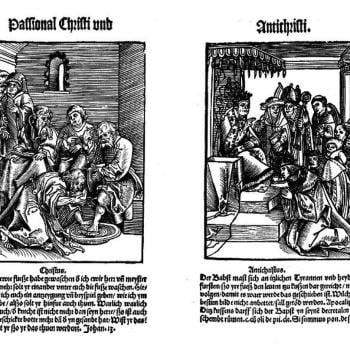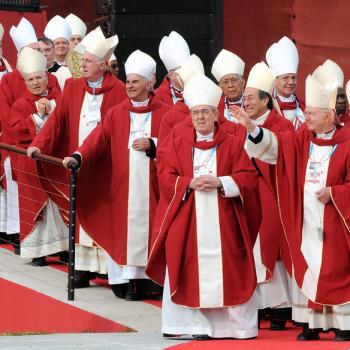Fair enough, David. I get what you are trying to do.
It just seems that a Faustus without the devil is hardly a Faustus–like Ahab without the whale, or Hamlet without his father getting killed. The whole point about Faustus is that he DOES believe in the devil, but considers the fulfillment of his desires worth the price of eternal unhappiness. You did get close to that when you had your Faustus say something like, “I will do anything, ANYTHING, to find my answers.” I’m trying to think of an archetype of someone who believes in no God, no devil, no heaven, no hell. Nietzsche? That architect in the Ayn Rand novel? Slim pickings, I admit.
But now you raise an even more puzzling question. Why believe in a Christianity without the supernatural elements? The supernaural elements are surely the best parts! Jefferson’s censored, cut-up Bible–you wouldn’t want anyone to do that with your plays!–leaves nothing but dried up moralism. He cut out all the parts about grace, redemption, atonement, forgiveness, suffering, resurrection. I admit that a lot of conservative Christians, in effect, do the very same thing. But they too are leaving out what makes Christianity so profound.
For example, you honor Christ, even worship him, agnostic that you are. Well, Christianity teaches that Jesus is God. That is to say, the true God, according to Christianity, is not the abstract deity that looks down upon the earth–how easy it is not to believe in that kind of God–but a transcendent deity who became a human being. Furthermore, this incarnate God turns out not to be like the deity of our speculations and projections, but someone gracious and compelling. That God, according to Christianity, is incarnate complicates issues in some important ways (even though, unaccountably to me, many Christians still imagine God as purely transcendent and not incarnate). Take the reason not to believe in God because how could there be a God when there is so much evil and suffering in the world. That assumes the imagery of a transcendent God looking down, separate, onto His creation. But if God, as Christianity teaches, became flesh and entered the human condition, and specifically took into Himself all of the evil and suffering in the world, which Christ did when He was crucified, that surely complicates the argument in some important ways. (It was your friend and character Luther who said that we ought never to think of God apart from His incarnation in Jesus Christ.) It seems to me that the problem with Christianity today is that it has already thrown out much of this supernatural stuff, to its great detriment.
Anyway, one of the things I appreciate about you as a writer and about your play is that, unlike many writers today, you are fair-minded when it comes to these religious issues. You give Luther his due, just as you give Faustus his due, and Hamlet his due.
Another question, if I may: How do you know so much about the Renaissance? Were you an English major who went on to get a Ph.D. in the field, like I did? If not, you seem to have learned about as much as I did with all that effort, what with your multi-valent references and allusions to the texts, personages, and ideas of the time. Or did you just pursue your own research on your own? If so, was this because you are interested in the area or because you wanted to write this play and needed to research the background and in doing so plunged so deeply into the scholarship?
And, finally, what are you working on now?











